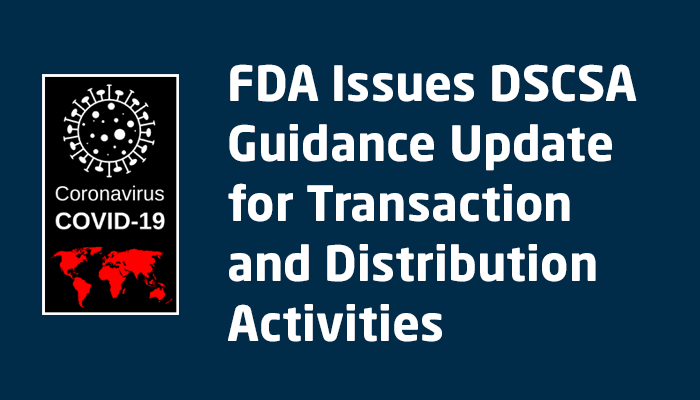On April 30, the U.S. Food and Drug Administration (FDA) issued guidance for “flexibility” pertaining to certain transaction and wholesale distribution activities under the Drug Supply Chain Security Act (DSCSA). This was a direct response to the COVID-19 public health emergency. Here’s what the FDA DSCSA guidance says.
Legal Basis for the FDA DSCSA Guidance
Public health emergencies in the United States are provided for under Section 319 of the Public Health Service Act (PHS Act). When an emergency is declared, two statutory provisions in the Federal Food, Drug, and Cosmetic Act (FD&C Act) are automatically triggered:
- The exemption of certain product distribution activities from the definition of transaction under the FD&C Act section 581(24)
- The exclusion of certain product distribution activities from the definition of wholesale distribution under the FD&C Act section 503(e)(4)
What the FDA DSCSA Guidance Says
The transaction exemption and wholesale distribution exclusion provisions mean that two DSCSA requirements do not apply to some distribution activities during the COVID-19 public health emergency:
1. Distribution of “covered COVID-19 products” to address the public health emergency. The transaction exemption and wholesale distribution exclusion apply to the following:
- The distribution of prescription drug products that have been issued an Emergency Use Authorization (EAU) by the FDA. To date, this includes hydroxychloroquine sulfate, chloroquine phosphate, and, as of today, May 1, remdesivir. An EAU designation does not mean the FDA has approved a drug for a specific use; to date, the FDA has not approved any product to treat COVID-19.
- FDA-approved products to diagnose, cure, mitigate, treat, or prevent COVID-19. According to the FDA website, this includes in vitro diagnostic products; high complexity molecular-based laboratory developed tests; personal protective equipment and related devices; ventilators and other medical devices; and therapeutics.
The FDA says that companies involved in the distribution of covered COVID-19 products should “maintain the security of the supply chain as these products are distributed to address the urgent public health need.” If possible, companies should continue to fully comply with the DSCSA regulations if doing so isn’t “a barrier to timely distribution of covered COVID-19 products.”
2. Distribution of other products affected by the COVID-19 public health emergency. The transaction exemption and wholesale distribution exclusion also extend to the distribution of “other affected products in certain circumstances.” For COVID-19, these circumstances exist when:
- The distribution activities are directly affected by the COVID-19 public health emergency.
- The distribution activities are for emergency medical reasons, such as treating symptoms of COVID-19.
The FDA gives three examples of when the COVID-19 public health emergency could directly affect distribution of these other products:
- Distribution to an area where product availability is limited and there is higher demand.
- Distribution by an authorized trading partner that needs to establish a new, temporary facility for distribution.
- Dispenser-to-dispenser transfers of products that are needed, regardless of whether there is a specific patient need.
3. There are a few other parameters for the FDA DSCSA Guidance:
- They apply only to products distributed to address the COVID-19 public health emergency.
- They apply to products that were already in the supply chain when the COVID-19 public health emergency was first declared.
- They do not apply to a drug shortage unless it is caused by the public health emergency.
- They are in effect only as long as the COVID-19 public health emergency is in effect.
Final thoughts
For the record, the U.S. COVID-19 public health emergency first went into effect on January 27, 2020. A 90-day renewal took effect on April 26. And as we all know, it’s had a huge impact on people’s lives and the global economy.
rfxcel is committed to being part of the solution. We recently released our Accurate Immunization Management Solution (AIM), an automated, cloud-based solution that tracks the dispensing of vaccines in the supply chain — including potential COVID-19 vaccines. We’ve joined the COVID-19 Healthcare Coalition. We are open and operating at full capacity. Contact us today if you have any questions about our supply chain visibility solutions or our work during the COVID-19 public health emergency.





